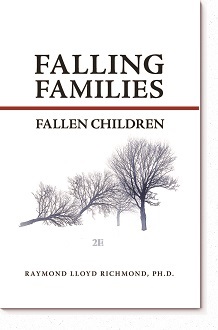|
|
|
There
is no fidelity, no mercy,
no knowledge of God in the land.
False swearing, lying, murder, stealing and adultery!
in their lawlessness, bloodshed follows bloodshed.
Therefore the land mourns,
and everything that dwells in it languishes. |
 |
—Hosea
4 : : 1b–3a 1b–3a |
Catholic Psychotherapy |
Spiritual Counsels |
Books |
About CSF
The
“Stain” | Resistance to
Authority | The Call Back to
Faith |
The Call Away from the World and
Self
 HROUGH my clinical work, I have looked deep
into the hearts and souls of many persons, not just lay persons but also
those in religious life and those contemplating entering religious life.
And I have consistently seen there a certain “ugliness”—a
stain, so to speak—resulting from childhood emotional wounds. HROUGH my clinical work, I have looked deep
into the hearts and souls of many persons, not just lay persons but also
those in religious life and those contemplating entering religious life.
And I have consistently seen there a certain “ugliness”—a
stain, so to speak—resulting from childhood emotional wounds.
The
“Stain”
Sometimes a child is stained
by blatant family dysfunction, such as alcoholism, adultery, divorce, physical
abuse, emotional abuse, or sexual abuse. These children often grow up with
a bitter inner attitude of social defiance, even to the point of criminal
activity.
Yet, more often than not, the
child suffers only from the wounds of more “normal” families who,
in one way or another, are simply hypocritical. That is, it’s rare in
today’s world to find any families who teach
children to love God with all their hearts and minds and strength and who
don’t indoctrinate their children right after
baptism with all the impiety of the
anti-Christian world around them. Because most parents
do not live out in their actions whatever
religious faith they profess with their lips, normal family life is
more often than not characterized by self-indulgence, resentment, criticism,
manipulation, hidden alliances, and a general lack of honest communication.
|
This lack of
communication can take either of two courses.
Authority in some
families can be all a fraud, just an excuse for
manipulation or intimidation, whereby the parents become domineering and
controlling. When children make mistakes, the parents will point at them and say,
“You’re bad!” instead of teaching the children how to fix mistakes. This intimidation
ultimately deprives the children of the emotional autonomy that is
necessary to love God with the free will of a pure heart. Hence the children become
emotionally crippled, exasperated, and prone to anger, depression, and even
suicide.
On the other
hand, if parents give children too much freedom, the children will grow up
without any sense of compassionate discipline
and guidance. Most kids are smart enough to realize that when parents give
them too much freedom it really means that the parents don’t care—or
don’t know any better themselves. So the children can end up with such
profound emptiness and
guilt about the meaningless pursuit of
self-gratification that they challenge everything out of pure frustration.
And where does that lead? To bitter identity confusion,
fear, anger, and
depression.
In either case,
then, a meaningful basis for rules and regulations is never
communicated. |
|
As a result, many children tend
to emerge from their families with an
unconscious
resistance to authority.
Resistance to
Authority
When children aren’t taught
the “language” of
honest emotional
encounter within their families, children tend to seek out “natural” ways—that
is, physical, bodily ways—to derive attention and satisfaction
from the world, such as through food, drugs, or sexuality.
And so we have a world filled with addictions, eating disorders (anorexia, bulimia, and
obesity), and perversions (immodesty, pornography, prostitution,
piercings and tattoos, and, in general, lifestyles defiant of
chastity).
This unconscious resistance to
authority more often than not leads to defiant behavior that focuses on immediate
physical satisfaction and a need to “be in control” to ward off
feelings of vulnerability and helplessness. This unconscious attitude not
only disrupts social harmony, but it can also cause spiritual problems in
regard to one’s religious
faith.
|
“We don’t
care what you want—or what’s legal or moral. We want what we
want, and we will get it, one way or another.” That’s the rallying
cry of the disgruntled, stemming from the motto of Satanism: Do what thou
wilt.
Feminists
make themselves “priests.” Activists clamor for homosexual “marriages.”
Protesters demand that the world accommodate itself to their
insanity. Liberals condone illegal
immigration.[1]
Enthusiasts flock around unapproved “apparitions.”
And on and on it goes in this world growing cold in faith. |
|
It’s a very sad thing. Family
emotional wounds can leave children believing that God hates them, that God is
cruel, that God is unfair, that God plays games with us, and that they have no
other recourse than to take matters into their own hands to get what they think
is right. But God is not unfair. God is just: “You are righteous
LORD, and just are your edicts” (Psalm 119:137). It’s
families who have lost their grounding in faith that
are cruel and unfair and have turned interpersonal relationships into game
playing.
I have often seen how some persons
struggling with inner emotional confusion try to hide this confusion by putting
on a religious habit or by taking up excessive religious
devotions. They use an outward
show of religious practices as a sort of
psychological defense to make themselves
seem holy and to appear as if they were being obedient. And therein
they miss the point about real holiness. Genuine Christianity requires a
deep, humble commitment of the heart; it’s
not like some sort of computer software application that you conveniently
run on your existing—and confused—operating system. True Christianity
is an entirely new “operating system” that completely replaces
the old one.
|
Some individuals
from dysfunctional families are often drawn to religious life—or
quasi-religious life (i.e., secular religious orders)—because they think
that obedience is easy. But, really, obedience for
them is not an act of love, it’s an act of
spite, a mere psychological defense
against their unconscious anger. “All right. So you’re going to
treat me miserably? Well, I’ll show you! I’ll take everything you
can dish out and I’ll take it without a murmur. So there!” But,
oh! Just wait. Slowly the frustration builds, and then the
anger erupts! It all goes to prove the point that
you can’t carry your cross if you are carrying
resentment.[2]
In fact, the most common impediment to spiritual
progress is this: the grudge that chains you to the past. |
|
Sooner or later, then, individuals
with a confused emotional life will go astray simply because their unconscious
resistance to authority prevents them from clinging to the rock of true
Faith.
The Call Back
to Faith
Now, when others go astray
from true Christian doctrine, it’s not
“judgmental” to tell them
so.
|
When someone
says, “Go to hell,” that is judgment.
But to tell others that they are living in sin and
are in grave danger of ending up in hell is a warning.
As for what will actually happen to those poor souls . . . well, only God can
make that judgment. |
|
Calling someone back to the true
Faith, therefore, is called preaching the
Gospel. When Saint
Dominic rescued southern France from the
Albigensian heretics in the thirteenth century,
for example, he didn’t preach that the heretics were
“bad,” he just preached the truth about
real Christianity. He preached the Gospel. It’s a truth that’s
the same yesterday, today, and forever. It doesn’t judge you for who
you are, it tells you what Christ told us all to do, regardless
of who you are—or think you are. rescued southern France from the
Albigensian heretics in the thirteenth century,
for example, he didn’t preach that the heretics were
“bad,” he just preached the truth about
real Christianity. He preached the Gospel. It’s a truth that’s
the same yesterday, today, and forever. It doesn’t judge you for who
you are, it tells you what Christ told us all to do, regardless
of who you are—or think you are.
Sadly, many of those today who
choose to live contrary to the Gospel try to
avoid social criticism for their sins through a political
advocacy that preys upon a general public fear of
being “judgmental.” It was a strategy
used in regard to gaining secular acceptance for
divorce and for
abortion, and now it’s being used in
regard to any sexual activity that defies chastity.
Yet it’s all heresy because it condones sin.
It even advocates for sin. And it persecutes those who speak the truth
about sin.
To speak of
heresy, however, is not judgmental; it’s
simply a statement of fact. The word heretic comes from the Greek word
hairetikos, which means “able to choose.” Thus a heretic
is someone who, to make religion more convenient, less demanding, and more
“relevant” to the ways of a pagan world, chooses some aspects of
the Faith and rejects other aspects of it, much like the disciples at Capernaum
who murmured, “This saying is hard; who can accept it?” (John 6:60).
Speaking bluntly about heresy, then, is an act of charity, for it reminds
others of the very sins that will condemn them to
hell if they aren’t
repented.
|
 When a pastor has been afraid
to assert what is right, has he not turned his back and fled by remaining
silent? Whereas if he intervenes on behalf of the flock, he sets up a wall
against the enemy in front of the house of Israel. Therefore, the Lord again
says to his unfaithful people: Your prophets saw false and foolish visions
and did not point out your wickedness, that you might repent of your sins.
The name of the prophet is sometimes given in the sacred writings to
teachers who both declare the present to be fleeting and reveal what is to
come. The word of God accuses them of seeing false visions because they are
afraid to reproach men for their faults and thereby lull the evildoer with
an empty promise of safety. Because they fear reproach, they keep silent
and fail to point out the sinner’s wrongdoing. When a pastor has been afraid
to assert what is right, has he not turned his back and fled by remaining
silent? Whereas if he intervenes on behalf of the flock, he sets up a wall
against the enemy in front of the house of Israel. Therefore, the Lord again
says to his unfaithful people: Your prophets saw false and foolish visions
and did not point out your wickedness, that you might repent of your sins.
The name of the prophet is sometimes given in the sacred writings to
teachers who both declare the present to be fleeting and reveal what is to
come. The word of God accuses them of seeing false visions because they are
afraid to reproach men for their faults and thereby lull the evildoer with
an empty promise of safety. Because they fear reproach, they keep silent
and fail to point out the sinner’s wrongdoing. |
|
|
— From the Pastoral
Guide
by Saint Gregory the Great, pope,
Office of Readings, Sunday,
Twenty-Seventh Week in Ordinary Time |
|
So to preach the Gospel is to
speak the truth. In this regard, we should remember the words of
Ezekiel:
|
You, son of man,
I have appointed watchman for the house of Israel; when you hear me say anything,
you shall warn them for me. If I tell the wicked man that he shall surely
die, and you do not speak out to dissuade the wicked man from his way, he
(the wicked man) shall die for his guilt, but I will hold you responsible
for his death. But if you warn the wicked man, trying to turn him from his
way, and he refuses to turn from his way, he shall die for his guilt, but
you shall save yourself. |
|
|
— Ezekiel 33:7-9 |
The Call Away
from the World and Self
If you read the
Bible carefully, and if you study the mystics, you
will learn that the only way to turn from the way of sin is to
turn away from the world. The spiritual counsels
on this website aren’t my “requirements,” they are
simply the purest psychological way to overcome one’s childhood resistance
to the sanctification offered through total surrender to the will of God.
After all, children who have been intimidated or betrayed by their parents
aren’t very eager to surrender to God. So they have to learn to enter
a different reality than the lies and game-playing they knew in their
families—they need to enter a divine reality of good will and
humility.
Consider, for example, what Saint
Cyprian said about this sanctification:
|
The Apostle Paul
instructs us in these words concerning the sanctification which God’s
loving kindness
 confers on us: Neither the immoral, nor idolaters,
nor adulterers, nor homosexuals, nor thieves, nor the greedy, nor drunkards,
nor revilers, nor robbers will inherit the Kingdom of God. And such indeed
you were. But you have been washed, you have been sanctified, you have been
justified in the name of the Lord Jesus Christ and in the Spirit of our
God. We were sanctified, he says, in the name of our Lord Jesus
Christ and in the Spirit of our God. Hence we make our prayer that this
sanctification may remain in us. But further, our Lord who is also our judge
warns those who have been cured and brought back to life by Him to sin no
more lest something worse happen to them. Thus we offer constant prayers
and beg night and day that this sanctification and new life which is ours
by God’s favor may be preserved by his protection. confers on us: Neither the immoral, nor idolaters,
nor adulterers, nor homosexuals, nor thieves, nor the greedy, nor drunkards,
nor revilers, nor robbers will inherit the Kingdom of God. And such indeed
you were. But you have been washed, you have been sanctified, you have been
justified in the name of the Lord Jesus Christ and in the Spirit of our
God. We were sanctified, he says, in the name of our Lord Jesus
Christ and in the Spirit of our God. Hence we make our prayer that this
sanctification may remain in us. But further, our Lord who is also our judge
warns those who have been cured and brought back to life by Him to sin no
more lest something worse happen to them. Thus we offer constant prayers
and beg night and day that this sanctification and new life which is ours
by God’s favor may be preserved by his protection. |
|
|
—From a treatise on the
Lord’s Prayer
by Saint Cyprian, bishop and martyr
Office of Readings, Tuesday,
Eleventh Week in Ordinary Time |
Thus, in total surrender to God,
through Christ, we can be cured of our old psychological
defenses, if only we turn away from them. But,
as our Lord Himself told us, those who want to be “cured and brought
back to life” must sin no more.
Now, we all have lapses, and
Christ promised mercy for those who
repent them. The point here is not about
occasional lapses, it’s about a total change of attitude—a detachment
from our old psychological defenses and our unconscious yearning to be
disobedient—and, in sorrow and disgust for
our sins, learning to trust only in God in
humility with a chaste and pure heart.
But what will happen to those
who refuse to turn from sin and in obstinate disobedience persist in filling
their eyes with the lusts of the world? Well, only God knows. I can’t
judge them, I can only repeat what Christ Himself said: “And if your
eye causes you to sin, tear it out and throw it away. It is better for you
to enter into life with one eye than with two eyes to be thrown into fiery
Gehenna” (Matthew 18:9). Christ should know. He, after all, will
judge us. He told us that Himself (Matthew 25:31-46).
So, to accept Christ’s
unfathomable mercy before it’s too late, recognize
the emotional wounds that have led you into
disobedience, take steps to heal those wounds,
and then let the dead bury the dead.

Notes.
1. And why is illegal
immigration so evil? It is evil
theologically because every illegal alien commits
mortal sin by breaking two of the Ten
Commandments: “Thou shalt not lie,” and “Thou shalt not
steal.” It is evil socially because it breaks up families in
the country of origin; it exploits the illegal aliens themselves in terms
of wages and benefits; it deprives legitimate citizens of jobs; it increases
the tax burden on taxpayers; and it brews a support system of criminal activity,
such as assault, rape, and murder.
And, let us not forget, it is evil civilly because it is illegal.
Remember, Saint Paul told us to be obedient to authority, because “whoever
resists authority opposes what God has appointed, and those who oppose it
will bring judgment upon themselves” (Romans 13:2).
2. Feelings of resentment are human and normal;
you can’t get through a day without feeling resentment about something.
You fall into sin, though, when you use the psychological
defense of
denial
to hide your feelings of resentment from yourself. Denying your resentment
only pushes it into the unconscious, and clinging to unconscious resentment
is what carrying resentment means.
Recommended
Reading
A treasure of a resource for psychological and spiritual healing. Information
gathered from my websites (including this webpage) is now available at your fingertips
in book form.
 |
 |
Falling Families, Fallen Children by Raymond Lloyd Richmond, Ph.D. Do
our children see a mother and a father both living in contemplative love for
God with a constant awareness of His presence and engaged in an all-out battle
with the evil of the world? More often than not our children don’t see living
faith. They don’t see protection from evil. They don’t see genuine, fruitful
devotion. They don’t see genuine love for God. Instead, they see our external
acts of devotion as meaningless because they see all the other things we do that
contradict the true faith. Thus we lose credibility—and when parents lose credibility,
children become cynical and angry and turn to the social world around them for
identity and acceptance. They are children who have more concern for social approval
than for loving God. They are fallen children. Let’s bring them back.
Ordering
Information |
|
|




 rescued southern France from the
rescued southern France from the
 When a pastor has been afraid
to assert what is right, has he not turned his back and fled by remaining
silent? Whereas if he intervenes on behalf of the flock, he sets up a wall
against the enemy in front of the house of Israel. Therefore, the Lord again
says to his unfaithful people: Your prophets saw false and foolish visions
and did not point out your wickedness, that you might repent of your sins.
The name of the prophet is sometimes given in the sacred writings to
teachers who both declare the present to be fleeting and reveal what is to
come. The word of God accuses them of seeing false visions because they are
afraid to reproach men for their faults and thereby lull the evildoer with
an empty promise of safety. Because they fear reproach, they keep silent
and fail to point out the sinner’s wrongdoing.
When a pastor has been afraid
to assert what is right, has he not turned his back and fled by remaining
silent? Whereas if he intervenes on behalf of the flock, he sets up a wall
against the enemy in front of the house of Israel. Therefore, the Lord again
says to his unfaithful people: Your prophets saw false and foolish visions
and did not point out your wickedness, that you might repent of your sins.
The name of the prophet is sometimes given in the sacred writings to
teachers who both declare the present to be fleeting and reveal what is to
come. The word of God accuses them of seeing false visions because they are
afraid to reproach men for their faults and thereby lull the evildoer with
an empty promise of safety. Because they fear reproach, they keep silent
and fail to point out the sinner’s wrongdoing. confers on us: Neither the immoral, nor idolaters,
nor adulterers, nor homosexuals, nor thieves, nor the greedy, nor drunkards,
nor revilers, nor robbers will inherit the Kingdom of God. And such indeed
you were. But you have been washed, you have been sanctified, you have been
justified in the name of the Lord Jesus Christ and in the Spirit of our
God. We were sanctified, he says, in the name of our Lord Jesus
Christ and in the Spirit of our God. Hence we make our prayer that this
sanctification may remain in us. But further, our Lord who is also our judge
warns those who have been cured and brought back to life by Him to sin no
more lest something worse happen to them. Thus we offer constant prayers
and beg night and day that this sanctification and new life which is ours
by God’s favor may be preserved by his protection.
confers on us: Neither the immoral, nor idolaters,
nor adulterers, nor homosexuals, nor thieves, nor the greedy, nor drunkards,
nor revilers, nor robbers will inherit the Kingdom of God. And such indeed
you were. But you have been washed, you have been sanctified, you have been
justified in the name of the Lord Jesus Christ and in the Spirit of our
God. We were sanctified, he says, in the name of our Lord Jesus
Christ and in the Spirit of our God. Hence we make our prayer that this
sanctification may remain in us. But further, our Lord who is also our judge
warns those who have been cured and brought back to life by Him to sin no
more lest something worse happen to them. Thus we offer constant prayers
and beg night and day that this sanctification and new life which is ours
by God’s favor may be preserved by his protection.